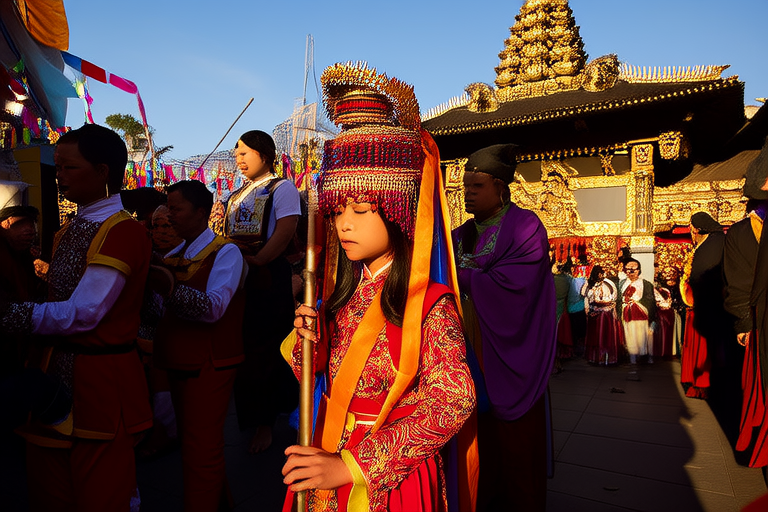Exploring Cultural Customs Through Local Festivals

Exploring Cultural Customs Through Local Festivals
Introduction:
Local festivals serve as vibrant windows into the rich tapestry of cultural customs that define communities around the globe. These celebrations, often deeply rooted in history and tradition, offer a unique opportunity for participants and observers alike to gain profound insights into the beliefs, practices, and daily lives of diverse cultures. For travelers, experiencing local festivals can be an enriching journey that fosters mutual respect and appreciation. By immersing oneself in these events, one not only enjoys the festivities but also learns valuable lessons about the people and places visited.
Participating in or merely observing a local festival allows individuals to witness firsthand the intricate details of a culture’s heritage. From colorful parades and traditional dances to elaborate feasts and sacred ceremonies, these events provide a comprehensive view of what makes each society distinct. Moreover, understanding the underlying meanings behind these customs helps bridge gaps between different groups, promoting harmony and cross-cultural dialogue.
Festivals as Cultural Showcases
One cannot discuss local festivals without mentioning iconic events like Carnival in Rio de Janeiro, Diwali in India, or Mardi Gras in New Orleans. Each of these festivals has its own unique charm and significance, reflecting the values and practices of their respective cultures.
In Brazil, Carnival is more than just a celebration; it is a national holiday where millions come together to dance samba, wear extravagant costumes, and enjoy street parties. Originating from Portuguese traditions, this festival dates back centuries and continues to evolve while maintaining its core essence. It celebrates life, joy, and community spirit, embodying the Brazilian philosophy of living in the moment.
Diwali, also known as the Festival of Lights, takes place across India and marks the victory of light over darkness and good over evil. This five-day event features fireworks displays, lantern lighting, and family gatherings centered around feasting and gift-giving. Diwali holds immense religious significance for Hindus, Sikhs, and Jains alike, symbolizing hope, renewal, and prosperity. Visitors can expect to see beautifully decorated homes adorned with rangoli patterns, hear traditional music, and taste mouthwatering sweets.
Mardi Gras in New Orleans showcases America’s multicultural heritage through its lively parades, floats, masks, and costumes. While initially inspired by French Catholic traditions, Mardi Gras has grown into a secular celebration embraced by all. Participants dress up in elaborate outfits, join street processions, and indulge in delicious Cajun cuisine. The festival culminates in Fat Tuesday, the day before Ash Wednesday, marking the beginning of Lent.
These festivals highlight essential aspects of their cultures, such as music, dance, costumes, food, and rituals. They bring people together, creating memorable shared experiences that transcend linguistic and cultural barriers. By participating in these events, travelers can develop a deeper appreciation for the richness and complexity of human expression.
Community Involvement and Participation
Local festivals frequently involve active participation from community members, who play crucial roles in preserving and transmitting cultural knowledge. Elders pass down stories and teachings to younger generations, ensuring continuity of traditions. Artisans craft intricate decorations and attire, while performers showcase talents honed through years of practice.
Visitors can contribute positively by engaging respectfully with locals during these events. For instance, attending workshops led by experts offers insight into specific crafts or performances. Volunteering at food stalls allows interaction with organizers and attendees, fostering connections. Additionally, learning basic phrases in the local language demonstrates respect and willingness to integrate.
By becoming part of the celebration rather than merely spectating, travelers enhance their understanding of the festival’s significance. They become co-creators of moments that will be cherished long after the event concludes.
Cultural Exchange and Global Awareness
Attending local festivals broadens perspectives on global diversity and promotes cross-cultural understanding. Exposure to unfamiliar customs encourages curiosity and openness towards new ideas, breaking down stereotypes and prejudices.
However, travelers may encounter challenges when navigating unfamiliar territories. Some practices might seem strange or uncomfortable at first glance. To navigate these situations effectively, it’s essential to approach them with genuine interest and a willingness to learn. Asking questions politely and listening attentively shows respect for the hosts’ efforts.
The positive impacts of cultural exchange extend beyond individual encounters. When visitors return home, they carry with them stories and experiences that inspire others to explore different parts of the world. This ripple effect contributes to greater awareness and appreciation of cultural diversity worldwide.
Conclusion
In summary, local festivals play a vital role in showcasing cultural customs, offering invaluable opportunities for learning and connection. By embracing these events, travelers can deepen their understanding of various societies and promote mutual respect and appreciation.
We encourage our readers to seek out and participate in local festivals as part of their travel experiences. Doing so allows for firsthand observation and engagement, enhancing overall enjoyment and enlightenment. Let us celebrate the beauty of our differences and work together toward building a more inclusive world.